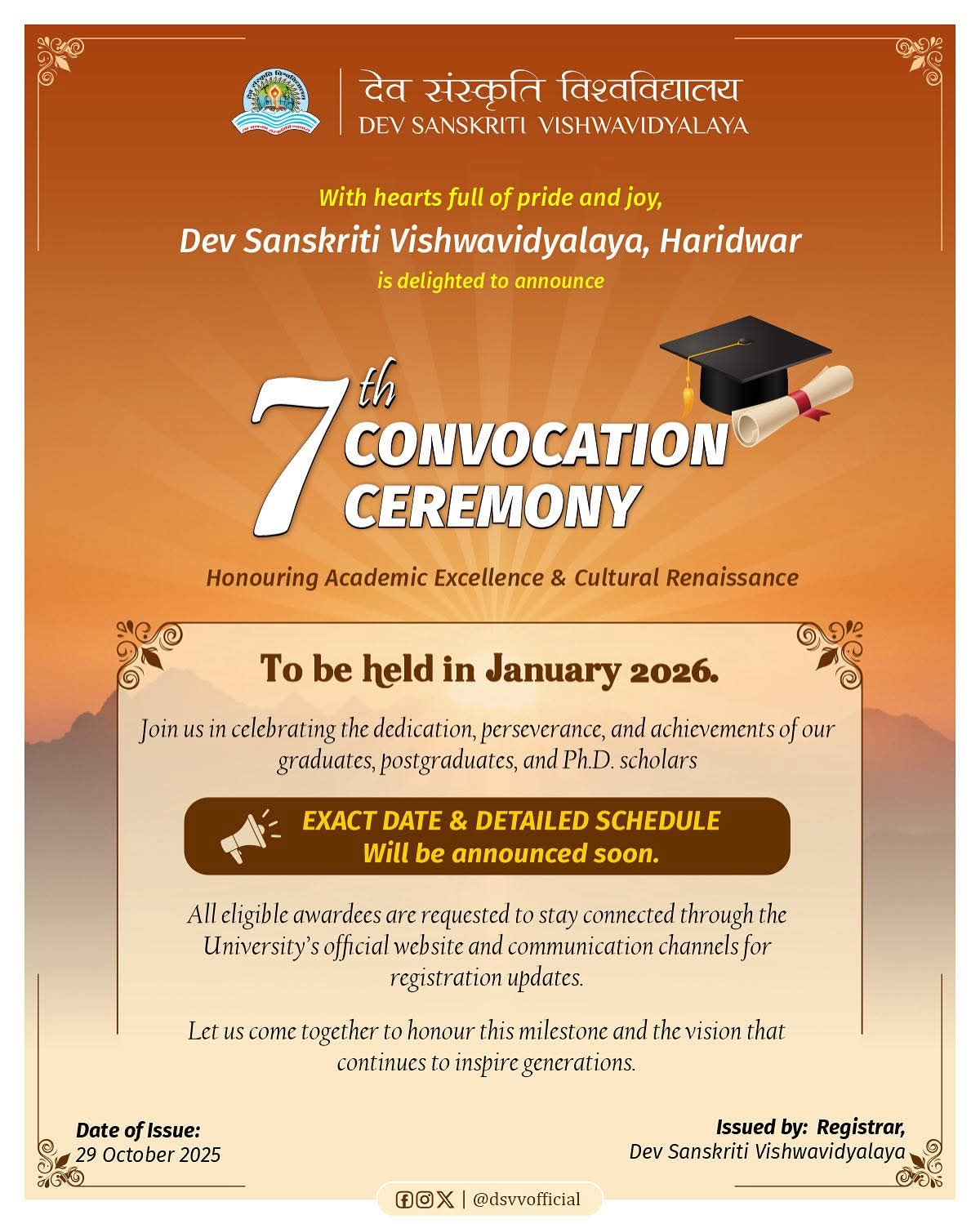M.A. Indian Knowledge Systems
1 Year Program – Research Only
Program Code: HSHSS6.5MAIKS
Duration: 1 Year (Full-Time)
Mode: On-Campus at Dev Sanskriti Vishwavidyalaya, Haridwar
Intake: July 2025
Department: Department of Scientific Spirituality
Faculty: Faculty of Human Values
School: School of Humanities, Social Sciences and Human Values, DSVV
Overview
The Department of Scientific Spirituality at Dev Sanskriti Vishwavidyalaya is offering a pioneering one-year program – M.Sc./M.A. (Indian Knowledge Systems) (research only). This intensive, purely research-oriented program aligns with the National Education Policy (NEP-2020) and provides participants an opportunity to do research in various areas of Indian Knowledge Systems.
Program Focus and Possible Research Areas/Topics
This program provides the opportunity of doing research in one or more of the following broad areas of Indian Knowledge Systems (including, but not limited to):
– Inner Development: Research on various topics related to Mind, Consciousness; other methods that lead to well-being such as meditation, mindfulness, Yoga etc., which come from various schools of thought such as Vedantic, Buddhist, Modern Yogis, Param Pujya Gurudev Pandit Shriram Sharma Acharya, and other contemporary thinkers and philosophers. Various areas including Indian Psychology and Spiritual Psychology can also be included.
– Health and Wellness: Various areas of Ancient and Ayurvedic perspectives of wellness, their procedures and integrations; other traditional remedies such as Yagya, etc., Technological advancements and technological integration in various Ancient Indian Remedies, validation of their effectiveness. Studies on various concepts of Nutrition and usage of Home Remedies etc.
– Leadership and Sustainability: The field of Management Science, which is focused on making a change in the outer world by bringing transformation in the inner world; Theory of Karma Yoga. Engaging in service (Seva) for inner refinement. Sustainability through inner transformation etc.
– Value Education and Technology: Teaching methodologies in Ancient Indian scenario, teaching process, ethics, character building, Teacher Training, understanding of developmental stages and academics as per Western System versus Indian System
– Inner and Outer Harmony through Communication studies, music and arts: Research on Classical arts, Dance and other expressive arts focused on inner development, for refining the mind and soul. Indian English Literature; Spiritual and positive journalism.
Some other related areas may include Arts and Literature, Basic Sciences, Travel and Tourism, Management, Health Sciences, Mental Health and Holistic Well-being, Indology, Meditation, Yogasanas, Mantra chanting, Yagya, Ayurveda, etc. The program also aims to apply modern scientific methods to study the ancient Indian wisdom, along with the study of its implications on an individual, family and society at large. In addition, the program aspires to incorporate Science, Philosophy and Spirituality that can be considered among the strongest backbones of Indian Culture in contemporary and ancient
The program aspires to explore the following areas (although a specific student will actually work on a single or a few of these areas):
- Religious Solidarity (Sarvadharma Samanvaya): The concept of universal religion that emphasizes on creating harmony and integration among all religions, peace, reconciliation, etc. can be explored. The research can incorporate rituals, traditions, and ethical principles. Policies, moral values, good conduct, and etiquette aimed at creating virtuous individuals and societies may also be included.
- Cosmic Consciousness and Vast Nature: The exploration of subtle and vast cosmic phenomena, human and divine cosmic awareness, and the mysterious layers of cosmic consciousness can be deeply studied. The aim would be to connect with cosmic consciousness and uncover its divine dimensions.
- Thought Science: The principles of psychology and philosophy that pertain to human thinking can be studied. Examining how ideas, faith, and beliefs contribute to determining human character and emotions. This research comes under the domain of thought science. It also includes the psychological study of worship, prayer, and meditation.
- Yagya Science: The scientific application of Yagya, its impact on the body and mind, and its philosophical background may be studied under Yagya Science.
- Other Areas of Research can be (including but not limited to):
- Sanskrit for Natural Language Processing and other Linguistics
- Indian systems of Social and Ecological Ethics and Logic.
- Indian Classical Arts: Performing and Fine Arts.
Research Framework
Students may engage in empirical and/or theoretical research using extensive literature, scientific papers, Classical Text analysis, Field Studies etc. through different Qualitative, Quantitative and Mixed Methods.
Program Structure
Semester 1
Thesis phase 1 – 20 credits
Life management course-1 – 2 credits
Semester 2
Thesis phase 2 – 20 credits
Life management course-2 – 2 credits
Total credits = 44
Life management – a value-added course (vac) offered by the Department of Life Management of the university
Moocs (massive open online courses) will be allowed as per university policy.

